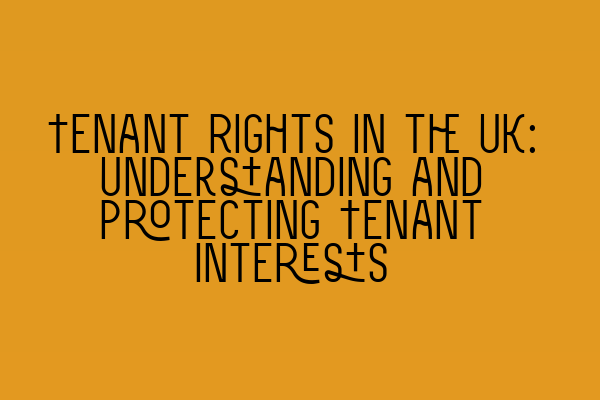Tenant Rights in the UK: Understanding and Protecting Tenant Interests
Welcome to the blog of SQE Property Law & Land Law! As solicitors specializing in property law, it is our mission to help individuals navigate complex legal matters related to real estate. In today’s post, we will be discussing an important topic that affects many individuals across the UK – tenant rights.
Renting a property can be an excellent housing solution for individuals and families alike. However, it is essential to understand and protect your rights as a tenant to ensure a positive rental experience. Let’s dive into some key aspects of tenant rights in the UK.
Security of Tenure
Security of tenure is a crucial aspect of tenant rights. It refers to the right of a tenant to remain in a property for a specified period, typically known as the tenancy term. The most commonly used tenancy in the UK is an Assured Shorthold Tenancy (AST), which provides security of tenure for a minimum of six months. During this period, the landlord cannot evict a tenant without a valid reason.
If you are a tenant, it is essential to be aware of the type of tenancy you have, as different tenancies offer different levels of security. Seeking legal advice can help you understand your rights and obligations as a tenant.
Rent Increase Restrictions
As a tenant, you have the right to know how your rent may be increased and under what circumstances. Landlords cannot increase the rent arbitrarily; there are legal restrictions in place to protect tenants from unfair rent hikes.
Typically, landlords must provide written notice of any rent increase, usually at least one month in advance. It is essential to review your tenancy agreement to understand the provisions related to rent increases fully. If you believe your landlord has unlawfully increased your rent, seeking legal advice can help you address the situation.
Repairs and Maintenance
Landlords have a legal obligation to maintain their rental properties and ensure they are safe and habitable for tenants. This includes keeping the property in good repair, ensuring proper functioning of utilities, and addressing any health and safety concerns.
If you encounter any issues with repairs or maintenance, it is essential to notify your landlord promptly. They are legally bound to address the issues within a reasonable timeframe. In case of any disputes or concerns, seeking legal advice can help protect your rights and ensure the necessary repairs are carried out.
Protection Against Unfair Eviction
Eviction can be a distressing experience for tenants, but it is essential to know that landlords cannot evict tenants without following the correct legal procedures. Unfair evictions are illegal and can result in severe consequences for landlords.
In the UK, landlords must provide tenants with a written notice of eviction, known as a Section 21 notice or a Section 8 notice, depending on the circumstances. These notices must comply with specific legal requirements. Tenants facing eviction should seek legal advice to ensure their rights are protected and to understand the options available to them.
At SQE Property Law & Land Law, we are dedicated to helping tenants understand and protect their rights. If you require legal assistance or advice regarding tenant rights, please don’t hesitate to contact our team.
Related Articles:
SQE 1 Practice Exam Questions
SQE 1 Practice Mocks FLK1 FLK2
SQE 2 Preparation Courses
SQE 1 Preparation Courses
SRA SQE Exam Dates
